The bites are small and swollen, looking very similar to pimples. Symptoms appear a few hours after the bite, so as soon as you start itching, try to get rid of them as quickly as possible to keep from getting more bites.
Where do chiggers live? How to identify and prevent chigger bites

![]()
Disclosure: This site is sponsored by ads and affiliate programs. We may earn money from the companies mentioned in this post. As an Amazon, Tripster and CJ Affiliate we may earn from qualifying purchases.
We moved a lot when I was young.
Sometimes we lived a city life.
At other points, my upbringing was decidedly rural. During these times, the local forests and fields were my playground.
My friends and I would disappear for hours on end, exploring, discovering, doing whatever the dictates of our flights of fancy demanded.
We spent part of one summer – in woods that none of our families had legal claim to – chopping down trees and bushes to expand a walking trail into something we could race our scooters down.
When you live your life in the woods and the fields and you are young enough not to learn the lessons life provides, you spend quite a lot of your summer itchy.
Poison ivy and poison oak.
To this day, if I see a tiny red dot moving in the grass, which happens decidedly less in adulthood than it did when I was a boy, a cold shiver runs down my spine.
God created many wonderful creatures with a wide array of purposes. I think the chigger is a demon spawn that escaped from the netherworld. That’s why it’s red.
On the one hand, chiggers are the most acceptable of life’s parasitic pests.
Unlike mosquitoes or ticks, they carry no diseases. There are no long-term physical health defects from a chigger.
However, on the other hand, it’s miserable to go to bed at night with your legs soaked in calamine lotion and your hands taped into oven mitts to lessen your ability to scratch.

What are chiggers?
If you’re looking for a more textbook definition, they are little red mites in the same class as spiders. They are also known as spider mites, berry bugs, harvest mites, bush mites, red bugs and scrub itch mites.
When in the larval stage, they target and feed on humans, snakes and small mammals. Their bites cause itchy hives, blisters, pimples or just red bumps.
Are chiggers dangerous?
Other than to your sanity, probably not. However, recent studies suggest chiggers could possibly carry alpha-gal.
Chiggers don’t stay attached to their human host long and will not infest your home. They don’t burrow or bite to consume a blood meal as a tick or mosquito would.
They will, however, drive you up the dang wall with their itchy bites. And if a person does too much scratching of that affected area, people with chigger bites can end up with secondary infections.
Why do they bite?
Chiggers bite in the larval stage. One hatched, they live in tall grass and leaves and wait for a host. And when they bite, they inject a substance into the host’s skin cells that cause the aforementioned symptoms.
They then eat the skin cells which helps them grow into adults.
Once they exit the larval stage, an adult chigger mite doesn’t bite or cause any other issues other than laying more eggs that become chigger larvae.

Where do chiggers live?
In my nightmares, rent-free.
Actually, chiggers like moist areas near thick vegetation. They like fields with tall grassy areas or wooded areas. Chigger habitats include places where there is a lot of leaf litter and dense vegetation often near creeks or streams.
Do chiggers infest a house?
No. Generally, they’re not looking to set up camp in your home.
Chigger populations will be found in the places mentioned above. If you have a chigger infestation it will be outside in the yard or near your trees.
How can you tell if you have chiggers?
Adult chiggers are bright red and look a little like a tick – in my opinion. But when chiggers are in the larval stage, they are 0.15 to .03 mm in size, so you are not likely to see than at all, unless you have a magnifying glass.
And today, scientists believe you are likely to see the results of the bites after the chiggers have moved on.
Young chiggers will have six legs while in their juvenile forms. An adult chigger will have eight legs like a spider. Sometimes you’ll see chiggers moving, other times they will appear as a stationary bright red dot.

What are the symptoms of chigger bites?
Once they’ve compromised the host’s skin, it takes about three hours for the symptoms to occur.
- intense, severe itching
- red bumps
- vesicles (blisters)
- red or reddish welts
- red spots
The symptoms will occur near the surface of the skin, often around the ankles, feet, legs and near the armpits, belt line or the groin.
Basically, any place where the human skin presents a nice, comfortable warm or moist fold where larvae can take a break. It’s like Panama City for mites.
What can I do for a chigger bite?
First, take a warm shower as soon as possible. Wash vigorously with soapy water, especially in the creases. Take your clothes and whatever else may have been exposed and wash them in hot water.
I was going to suggest taking them outside and burning them. But I’m told that’s excessive.
After that, use whatever is your anti-itch go-to. As I said, I spent much of my youth keeping the calamine lotion industry in business. However, I imagine any type of over-the-counter antihistamine would help.
If your symptoms linger for more than a few days and/or your bite areas get worse or appear infected, it would be wise to consult a healthcare provider who can help with the recovery.

How can I prevent chigger bites?
Never go outside again. Just kidding. However, if you must go outside, get an insect repellent that works on chiggers.
Unlike ticks, chiggers prefer getting inside your tight socks and crawling under your clothing. Use repellent directly on your skin under your socks and also on your clothing before heading out to the woods or tall grass. If hiking, staying on the trail is also helpful.
You can also purchase protective clothing that will help ward off chiggers and other pests. If you have an infestation in your yard, there are a variety of products, insecticide sprays or services that will help clear the little monsters from the yard.
In a temperate climate, chiggers are most likely to bug you in the summer, when the weather is warm. Pun intended.
Why do chiggers exist?
It’s a circle of life thing. I’m told they serve an essential role in the ecosystem.
And while they bother us during the juvenile stages – once they become adult chiggers they leave us alone and eat invertebrates in the soil that might otherwise impact the food and forest ecosystems.
Related Posts

Lake proponents argued that turning Cades Cove into a body of water would promote tourism (photo by Patrick Jennings/stock.adobe.com)
Where Do Chiggers Live? – Everything You Need To Know
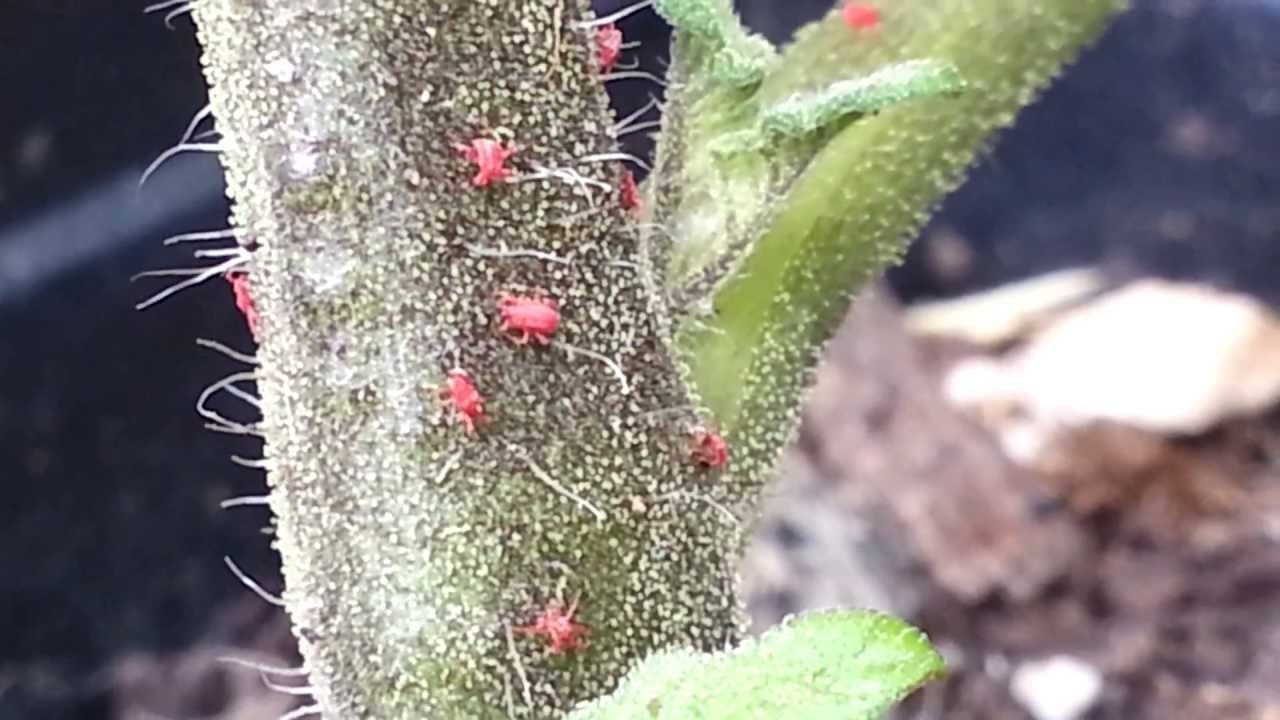
Chiggers are a common concern of people who love to travel around the depths of woods or even have beautiful gardens. However, no matter how tiny they look, they prove quite dangerous and damaging to human skin. Their bite gives painful rashes and itches to every victim which takes a lot of time to heal. So, everybody wants to avoid the places they are found.
Where Do Chiggers Live?
Chiggers are everywhere across the globe where there is a warm to hot climate. They easily spread from one person to another. Once you know where chiggers live, let us get into other issues? They will not survive under 60 degrees Fahrenheit and above 99 degrees Fahrenheit.
Keep yourself well covered when walking in thick vegetation. Wash your clothes, take a shower when you reach home, and apply anti-itching ointment if they bite. Their bites appear in clusters of red itchy swollen pimples and appear very close to each other. Do not scratch or the infection will become serious.
If you’re hiking, your perfect bet to avoid getting chigger bites would be using a bite relief stick and avoiding wandering off hiking trails. In this article, you can understand where chiggers live.
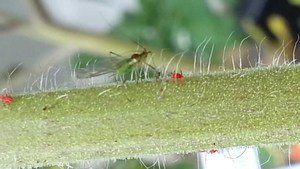
If you’re not hiking and want to avoid chiggers, try to stay away from vegetation that’s low to the ground because that’s where they will be.
Chiggers won’t bite in temperatures under 60 degrees Fahrenheit and are not found in areas above 99 degrees Fahrenheit.
How to avoid chiggers?
Above I talked more about where chiggers live. I want to go over how to avoid being bitten by chiggers in more detail.
You can start by wearing long pants, and high socks, and don’t wear open-toe shoes. Chiggers crawl up your legs to bite you. When you walk by any thick vegetation, they will attach themselves to your pants or any other articles of clothing they can grab onto.
As I said above, if you’re hiking, stay on the trails and if you need to walk through the woods or grass, try to avoid thick vegetation that’s low to the ground.
When you get home from being outdoors, you need to shower and wash your clothes immediately. Suppose you shower and scrub your skin it will scrub the chiggers right off of you. If you wash your clothes, it will wash the chiggers right out of your clothes, so Who can wear them again.
What to do when chiggers bite?
Chigger bites will drive you crazy, and they keep biting for up to a day. You’re going to want to get rid of the chiggers as quickly as you can. After you get rid of the chigger, you can start healing the bites to reduce the itching.
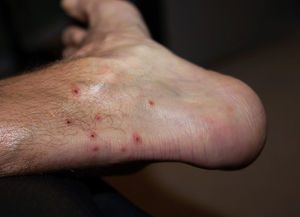
Steps to follow a chigger bite:
- Wash your clothes: Washing your clothes will eliminate any chiggers that are still in your clothes, waiting to get close enough to your skin to feed.
- Take a shower: Chiggers stay on your body and will bite you multiple times in a small clustered area because they get bored of one spot. They love to change spots to bite but won’t move too far. Chiggers will usually stay on your skin between 4 days and a week. They will continue to bite you as long as you let them. Taking a shower will remove any fleas sitting on your skin. Just make sure you scrub yourself.
- Mend the bite: If you want to stop the itching, you should start treating the bites as soon as possible. If you couldn’t get rid of the chiggers still biting you, there’s another way. You can get rid of the chiggers by applying nail polish or rubbing alcohol to the bites to suffocate them. After suffocating the chiggers, you should apply an anti-itching ointment such as, which is highly effective.
Why do chiggers bite?
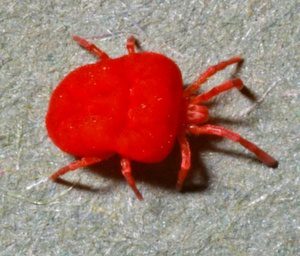
Chiggers are the larva form of mites. Mites, as you may know, feed on skin. They are very closely related to ticks and spiders. They generally feed on human skin but will feed on any other creature that may wander near them.
If you don’t get rid of the chiggers, they will stay in your skin for up to a week before dropping off. When they finally drop off, they will leave small red swollen welts. These welts are what cause the severe itching that drives us crazy.
Because chiggers are the larva form of mites, they don’t just feed on the skin but instead feed on the flesh of their host. This is the only time during the mite life cycle that they will feed on live humans.
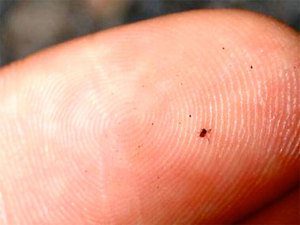
Cycle chiggers have 6 legs instead of the 8 legs that an adult mite will have during this life. This is the easiest way to tell the difference between chiggers and adult mites.
Calling the welts “bites” can be somewhat misleading. Chiggers don’t actually bite you. Instead, they burrow into your skin to form a hole in the softer tissue underneath. When they finally get to the softer skin underneath, they inject an enzyme that helps break and liquefy skin cells. They then begin to feed for up to a week.
What do chigger bites look like?
I understand that above I said chiggers don’t actually bite you. For now, though, let’s call them bites because that’s exactly what they look like.
Chigger bites are small red welts that form on your skin. Suppose the bites are in small tight clusters where the chiggers have been. They like to change spots when on a host, so they tend to move around a lot. They don’t go very far, though, so the bites are really close together.
The bites are small and swollen, looking very similar to pimples. Symptoms appear a few hours after the bite, so as soon as you start itching, try to get rid of them as quickly as possible to keep from getting more bites.
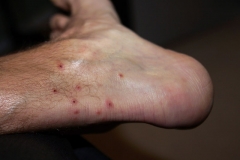
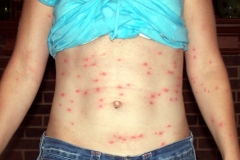
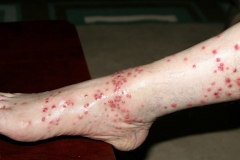
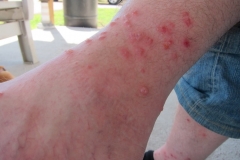
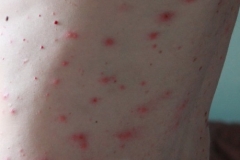
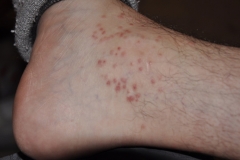
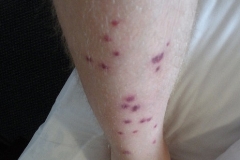
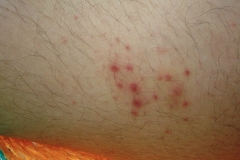
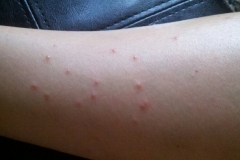

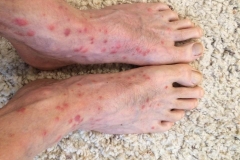
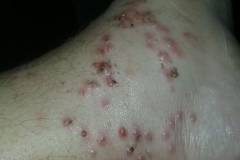

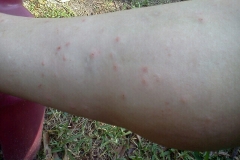
Health Risks of Chiggers Bite
Chiggers don’t carry diseases, unlike their relative, the tick. Because chiggers don’t actually feed on blood, you don’t have to worry about transmitting diseases. The only thing you have to worry about is the same thing you have to worry about with any insect bites.
Do not scratch! Scratching the bites can lead to infection, and that’s where things can get dangerous. If your bite is beginning to look infected, see a healthcare professional immediately.
Closing Thoughts
Chiggers don’t carry diseases, unlike their relative, the tick. Because chiggers don’t actually feed on blood, you don’t have to worry about transmitting diseases. The only thing you have to worry about is the same thing you have to worry about with any insect bites.
Do not scratch! Scratching the bites can lead to infection, and that’s where things can get dangerous. If your bite is beginning to look infected, see a healthcare professional immediately.
People also search for –
- What Are Chiggers?
- What Are Chigger Bites?
- How to kill Chiggers?
- Check Chigger Relief Creams
- Chigger Relief Liquids






